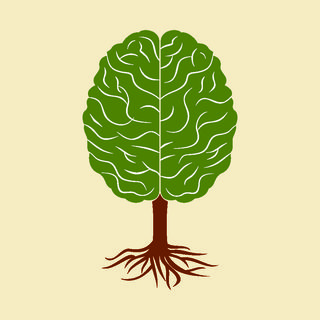Dementia
The Bark That Never Forgets
The cortex of the brain can preserve older memories in dementia.
Posted June 22, 2019

In our last article, we discussed how new memories are formed and stored in the hippocampus—a seahorse-shaped organ in the brain that may become damaged in a variety of brain disorders. In this week’s article, we will continue our exploration of episodic memory—memory for episodes of our life—with a look at why many older memories are preserved in dementia by examining the cortex.
Did you know that the word "cortex" means bark in Latin? The cortex is the outer layer of the brain, just as the bark is the outer layer of the tree.
Older memories are stored in the cortex
It often appears remarkable that an individual with dementia who does not know where they are or what they had for breakfast that morning may still be able to remember their friends from high school. The reason is that whereas memory for one’s current location or breakfast is stored in the hippocampus, memories for high school friends are actually stored in the outer layer of the brain, called the cortex. Most causes of dementia, such as Alzheimer’s disease, do not affect the cortex until later in the disease.
This discrepancy between remembering things that happened long ago versus activities from the day or week before is often confusing for families. We have had many families who tell us that whatever is wrong with their parent, they’re sure it can’t be Alzheimer’s, because they can still remember everything that happened 50 years ago. You now understand why remembering things that happened long ago may be preserved in Alzheimer’s and other causes of dementia—at least for a while—because these older memories are stored in the cortex. The memory problem in dementia is typically difficulty remembering what happened recently, because of the failure of the hippocampus.
Not recognizing family is often due to the failure of the hippocampus or cortex
“My how big you’ve grown, I hardly recognize you!” is frequently expressed by friends and family if they haven’t seen a child in months or years. Have you ever wondered how that recognition takes place?
We all have representations of individuals that are updated by our hippocampus every time we see the person. So, if we visit our nephew each year, we are able to recognize him this year due to some shared features in our representation from last year. Importantly, we can then update our representation of him with how he looks now. Thus, even though we don’t see many similarities from his baby picture to a picture of him as a young man, we have always been able to recognize him, because we have seen him in the intervening years, and our hippocampus updated our representation of him each year.
In dementia, the hippocampus fails at some point, no longer being able to form and store new representations. When this happens, the representation of an individual may be stuck two, five, or 10 years earlier. Thus, the individual with moderate dementia may not recognize her grandson, because her representation of him is stuck at age 10, even though he is now 22 years old.
As the dementia progresses, older memories from the cortex begin to be damaged—typically the newer memories first. So, by the time the individual’s dementia is in the severe stage, she may have lost all representations of her grandson, and may not recall that she has any grandchildren—or even any children.
Not recognizing home may also be due to damage to memories in the hippocampus or cortex
It is a similar issue when one does not recognize the home they are living in. If the home is relatively new—say a retirement community that they moved into six months ago—the problem may be due to deterioration of the hippocampus impairing their memory for the present and the last six months. If the home is one they lived in for the last 30 years, then the problem is that there is deterioration of both the hippocampus and the cortex, literally erasing or making inaccessible some of the memories for the past 30 years.
© Andrew E. Budson, MD, 2019, all rights reserved.
References
Budson AE, O’Connor MK. Seven Steps to Managing Your Memory: What’s Normal, What’s Not, and What to Do About It, New York: Oxford University Press, 2017.
Budson AE, Solomon PR. Memory Loss, Alzheimer’s Disease, & Dementia: A Practical Guide for Clinicians, 2nd Edition, Philadelphia: Elsevier Inc., 2016.


